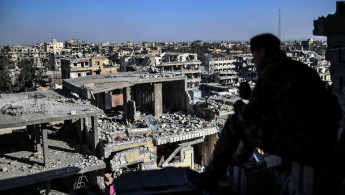Crowd-sourcing war crimes investigations: Digital activists track US-led airstrikes which destroyed Raqqa
The US and its coalition partners launched their campaign against the Islamic State group in 2014, driving out the militants from their self-proclaimed Syrian capital in Raqqa three years later.
During the four-month campaign from June to October 2017, the coalition carried out tens of thousands of airstrikes and fired 30,000 artillery rounds on the city. US forces were responsible for over 90 percent of the airstrikes.
The devastating campaign saw more than 80 percent of the city destroyed - possibly the most extensive destruction of a city in modern conflict.
More than 11,000 buildings were flattened and at least 2,500 bodies have been recovered from the rubble, with thousands more still expected to be found.
'Strike tracker'
Thousands of digital activists will take part in the next phase of Amnesty International's 'Decoders' crowdsourcing data project investigating the scale of casualties in the four-month military campaign.
 |
The devastating US-led campaign saw more than 80 percent of Raqqa destroyed – possibly the most extensive destruction of a city in modern conflict |  |
Since 'Decoders' launched in 2016, Amnesty has mobilised more than 50,000 digital activists from 150 countries.
The next phase, launched on Wednesday, is called 'Strike Tracker' and will see volunteers - of all ages and backgrounds - analyse satellite imagery from open sources to determine a timeline for the destruction of civilian buildings.
"With thousands of 'Strike Trackers' on the case to help us narrow down precisely when and where coalition air and artillery strikes destroyed buildings, we can significantly scale up our ability to map out the apocalyptic destruction in Raqqa," Milena Marin, Senior Adviser for Tactical Research on Amnesty International's Crisis Response team, said.
Before June 2018, the US-coalition admitted causing only 23 civilian deaths in Raqqa, while the UK Ministry of Defence maintains that its hundreds of airstrikes on a densely populated city resulted in zero casualties.
Following a detailed Amnesty report in June, the US-coalition quietly admitted it caused a further 77 deaths, all of which had been documented by the human rights groups.
"The coalition will not concede casualties without very specific evidence of airstrikes," Marin told The New Arab.
"The coalition message is constantly that there were no civilian casualties, but they conceded to some of those cases, and we want as much documentation of the results of airstrikes so they change their position."
Amnesty International and Airwars will publicise the results of 'Strike Tracker' as part of an interactive digital platform in early 2019.
Accountability in conflict
The aim of 'Strike Tracker' is to raise awareness of the devastating impact of large-scaled military action in Raqqa, and ultimately to force the US-coalition to accept greater responsibility and carry out meaningful investigations.
Since the offensive for Raqqa ended, the US-coalition has not conducted any investigations on the ground into casualties resulting from their military operations, despite being in Raqqa frequently to meet local partners.
 |
During the four-month campaign from June to October 2017, the US-led coalition carried out tens of thousands of airstrikes and fired 30,000 artillery rounds on Raqqa |  |
"They don't look at homes destroyed by their bombings or meet the families of relatives wiped out in their bombings," Donatella Rovera, Senior Crisis Response Adviser at Amnesty, told The New Arab.
"It is a dereliction of their duty, a refusal to take responsibility for what they have done."
Rovera says the data gathered by the project will paint a comprehensive picture of the pattern of coalition airstrikes which can help determine the circumstances of civilian deaths.
"Ultimately the coalition must take responsibility over what impact the airstrikes have had and ensure the victims who lost relatives, homes and limbs received the assistance, reparations, and, ultimately, the justice they deserve," Rovera said.
Since the battle ended in October 2017, Amnesty's evidence of violations of international humanitarian law by the US-led coalition has prompted them to revise its civilian death toll from 23 to more than 100, a 300 percent increase.
Despite the progress made by Amnesty in pushing the US-coalition to admit documented civilian casualties, there is still a "long road ahead", Marin told TNA.
"With bodies still being recovered from the wreckage and mass graves more than a year later, this is just the tip of the iceberg."
Follow us on Twitter: @The_NewArab



